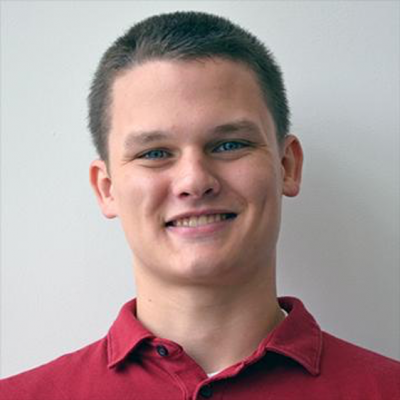Student Spotlight: Jeremy Keys

February 17, 2020
Jeremy Keys is a doctoral student in biomedical engineering from Scituate, Massachusetts. After earning his undergraduate degree at the University of Massachusetts Amherst, he chose to pursue further study at Cornell due to the supportive environment.
What is your area of research and why is it important?
My research looks at the biological and physical factors which regulate the spread of cancer throughout the body. Specifically, I am interested in how cancer cells generate forces to help squeeze their nucleus through tight spaces in biological tissues. In our lab, we have developed microfluidic “obstacle courses” which mimic the complex web of cells and tissues that cancer cells migrate through during metastasis. By disrupting forces inside the cell using either gene-silencing approaches or targeted laser ablation, we can better understand whether cells primarily push or pull their nucleus through these constrictions.
What are the larger implications of this research?
My work seeks to uncover novel targets for cancer therapies. By improving our understanding of how cancer cells metastasize (the process of cells spreading from a primary tumor in order to form other tumors elsewhere in the body), we can develop new drugs which specifically inhibit these mechanisms of cell migration, and thus we can potentially improve the long-term efficacy of cancer treatment.
What inspired you to choose this field of study?
Beyond my own academic interest in the interplay between cells and mechanics, I chose this field because cancer is such a wide-reaching disease that will affect everyone, either directly or indirectly, at some point in their lives. Having seen the physical, emotional, and financial tolls that this illness has caused on the lives of many of my friends and extended family, I have always felt that seeking to improve the treatment of cancer is an important goal.
Where did you study with your Graduate School Research Travel Grant?
I went to the Howard Hughes Medical Institute at Janelia Farms in Ashburn, Virginia. We worked with the Advanced Imaging Center to use highly precise microscopy equipment to capture high-quality videos of cancer cells migrating through a 3D environment.
How important was obtaining a Research Travel Grant for your research?
This grant was immensely helpful in mitigating the cost of traveling to Virginia and carrying out this research.
What did this grant allow you to do that you might not have otherwise been able to?
Thanks to this grant, we were able to capture highly detailed videos which help to illustrate the precise mechanisms that cells adopt to navigate through complex 3D environments. Imaging cells in these environments is typically very difficult, and most microscopes fail to capture the level of detail necessary to see these sub-cellular mechanisms at work. Thanks to this grant, we were allowed to use this group’s custom-made, high-definition microscope (a lattice light sheet microscope) which made this imaging possible.
What are your hobbies or interests outside of your research or scholarship?
Outside of my academic research, I am very interested in film history and criticism. I’m a member of Ithaca Fantastik, a local film programming group, and I regularly write film criticism online in my spare time. Additionally, I have recently been involved in helping Ithaca DSA in their voter registration efforts and am also a regular at the Ithaca Dog Park with my dog, Ellie.
Why did you choose Cornell to pursue your degree?
I chose to pursue my degree at Cornell because I was so impressed with how welcoming and supportive the faculty and other students were during the visiting weekend. Because doing graduate research is so often fraught with uncertainty and small failures along the way, surrounding oneself with a supportive core of an excellent advisor and other mutually understanding grad students can make the long-haul of a Ph.D. immensely more rewarding.
